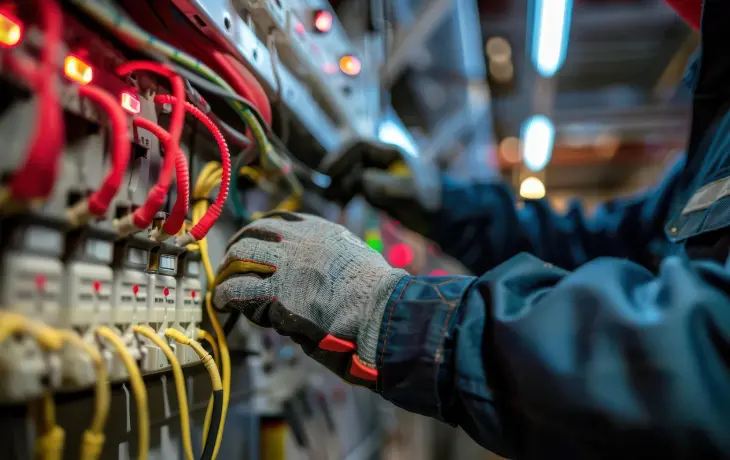In the electrical field, there are various types of electrical work. This is because the power needs of a home vastly differ from those of a warehouse, office building or industrial plant. Therefore, the first step in an electrical project is to ensure you hire the right technicians for the job.
When your project is commercial, you’ll need a commercial electrician. In this article, we’ll discuss everything you need to know about commercial electrical work.
What exactly is commercial electrical work?
Commercial electrical work refers to the installation, repair and maintenance of electrical systems in non-residential settings. This includes offices, retail stores, restaurants, warehouses, schools, medical centers and industrial facilities. Unlike home wiring, these systems are designed to support heavier loads, serve a larger number of users and integrate specialized equipment such as data systems, emergency power and automated lighting.
What are the key differences between commercial and residential electrical work?
Although both residential and commercial electricians interact with electricity, the scope and complexity of their work differ significantly. Here are the commercial versus residential electrical work differences.
· Scale and complexity: Residential electricians deal with smaller, less complicated systems designed for homes. On the other hand, commercial electricians deal with more complex electrical systems that need to accommodate various electrical systems, such as fire alarm systems, specialized equipment and power machinery.
· Voltage and power requirements: Residential systems operate at lower voltage (120/240 volts) and have reduced power requirements. Commercial setups operate at higher voltage (277/480 volts) and require efficient power distribution to handle larger equipment and lighting systems.
· Wiring and design: Commercial electrical wiring is often routed through conduits in exposed locations for easier access and durability, whereas residential wiring is typically run behind walls. In addition, commercial designs should accommodate high-capacity panels, backup systems and scalable data networks.
· Code compliance: While safety is paramount in both cases, commercial buildings are subject to stricter building codes, including ADA compliance, fire alarm integration, emergency exit lighting and advanced grounding systems.
· Maintenance and access: Commercial electrical maintenance is usually proactive and should be scheduled regularly to minimize downtime. Residential repairs tend to be reactive and isolated in nature.
What types of businesses or properties require commercial electrical services?
Nearly every non-residential building needs professional commercial electrical services. In every case, the wiring must be tailored to the building’s function, occupancy and safety requirements. Examples include:
· Offices: Business offices require reliable lighting, data infrastructure and climate control systems.
· Retail stores: These stores depend on secure power for point-of-sale systems, display lighting and HVAC.
· Restaurants: Need high-capacity wiring for kitchen equipment, ventilation systems and refrigeration.
· Warehouses and distribution centers: These large buildings require industrial lighting, conveyor systems and emergency power sources.
· Schools and universities: Learning institutions require advanced fire alarm systems, reliable internet connectivity and comprehensive power support for lab equipment.
· Healthcare facilities: These facilities demand ultra-reliable power for life-saving equipment, emergency lighting and security systems.
· Factories and industrial plants: Commercial buildings require industrial electricians to install and maintain high-voltage systems, motor controls and automation infrastructure.
What specific services do commercial electricians provide?
A qualified commercial electrician offers a wide range of services to support a building’s electrical infrastructure throughout its lifecycle. Common types of commercial electrical work include:
· Designing and installing complete electrical systems for new commercial construction.
· Reconfiguring electrical systems for business renovations and tenant improvements.
· Upgrading electrical panels to handle increased power demands and improve system safety.
· Installing, maintaining and repairing interior, exterior and energy-efficient LED lighting systems.
· Setting up structured wiring for data networks, telecom systems and low-voltage applications.
· Installing and maintaining emergency lighting and exit sign systems to ensure safe evacuation during power outages.
· Wiring and integrating components for commercial fire alarm and life safety systems.
· Installing and servicing backup generators and transfer switches to ensure business continuity.
· Performing routine inspections, testing and preventive commercial electrical maintenance.
· Troubleshooting electrical issues.
· Repairing damaged wiring, electrical components and malfunctioning devices.
· Upgrading outdated systems to meet current safety regulations and building code standards.
Why is proper commercial electrical work so critical for a business?
Having a reliable electrical infrastructure is key to ensuring operations run smoothly when it comes to running a business. Here are a few benefits of professional commercial electrical services.
· Safety: Correctly done electrical work minimizes the risks associated with faulty wiring, such as fires, equipment damage or workplace injuries.
· Uptime and productivity: Electrical failures can halt business. Preventive commercial electrical maintenance reduces the risk of costly downtime.
· Energy efficiency: Upgrading to LED lighting or installing smart systems can lower utility bills and reduce environmental impact.
· Legal compliance: Building codes, OSHA (Occupational Safety and Health Administration) and ADA regulations require full electrical compliance. Mistakes can result in hefty fines or even lawsuits.
· Protecting equipment: Sensitive technology, such as servers, medical devices and machinery, requires clean, consistent power. Businesses in sectors like data centers and telecoms often rely on telecommunication software development to integrate smart monitoring systems and ensure real-time control over electrical infrastructure. A poorly wired system can ruin expensive business equipment.
· Business continuity: With proper planning, backup generators, surge protection and emergency lighting, businesses stay operational even during power disruptions.
Conclusion
The electrical infrastructure of a commercial building is a critical component of its operations. Therefore, as a business owner, you need to work with professional commercial electricians to ensure your systems are safe, reliable and efficient. Whether you want to upgrade your electrical systems or improve energy efficiency, partnering with certified commercial electricians like Winward is crucial for your business’s success.
Also Read-Boost Your Business Visibility with Mobile Advertising








